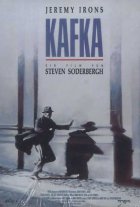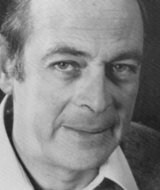
Kafka Page #16
- PG-13
- Year:
- 1991
- 98 min
- 697 Views
KAFKA:
MURNAU:
A mere slip.
(coming forward)
Your friend Mr. Raban dealt only
with claims that came in, another
department being responsible for
compensation that goes out -- this
is correct?
He places a fatherly hand on Kafka's shoulder.
MURNAU:
(not quite in the
light yet)
Through a very unfortunate -- and
mishap, a document intended for
the one department was sent to
the other. And for the first
time -- though your friend
wasn't aware of it -- two and
two could have been put together
to make one.
KAFKA:
(again)
MURNAU:
(face bending into
the light)
You see, Kafka, in all cases
relating to the factory at
Orlac -- which is what this
paper referred to -- the
authority that puts in a
request and the authority that
grants it is, to all intents
and purposes, the same authority.
And he's an impressive, imposing figure of authority
himself. You'd probably trust him. You'd certainly respect
him. But if you look into his eyes, he's frightening.
CUT:
UNDERGROUND CRYPTS
Mr. Pick runs from the crazed prisoners chasing him. Fires
his gun back at them, dropping one or two -- but then runs
out of bullets.
The prisoners slowly surround him. He backs away. One of
those chains that run throughout the Castle has its base
here. Mr. Pick keeps backing up, unavoidably, the deranged
prisoners closing in -- until he falls backwards with a cry
into the grinding wheels of the chain-system.
Caught up in the chain, he's carried aloft with it, up to the
ceiling. The chain is the lifeline of the Castle and does
not, could not, ever stop. Instead it forces Mr. Pick to go
along with it, his head CRACKING through the glass or wood
"manhole" cover through which the chain passes.
CUT:
MURNAU'S OFFICE
Kafka tries not to flinch in the presence of this deadly
figure.
MURNAU:
-- You seem amused.
KAFKA:
It only amuses me in that
in some circumstances may
decide the life of a human being.
Ekman sighs -- as if at a difficult child.
MURNAU:
expediency. It's imperative
that my room to maneuver not
be hindered by ... bureaucratic
ramifications.
Ekman, who doesn't hear very well, directs one ear in
particular back and forth between the other two. Kafka just
keeps looking at the charismatic man pacing around him --
who's now lighting an expensive cigarette of the kind that
was in the ashtray at the lab.
MURNAU:
there in the distant mountains
so far away from civilizing
influences happens to meet
with an unfortunate accident
-- and should he tragically die
in spite of the District Medical
Officer's strenuous efforts to
save him -- the firm wants to
see the next of kin pacified
and the disposition of the
remains handled with the
greatest possible ... efficiency.
KAFKA:
(becoming clearer)
"Accident and Compensation" --
no one can accuse the firm of
promises.
MURNAU:
(to Ekman)
expectations.
KAFKA:
(virtually to
himself)
I had the grandest of financial
plots in mind, the most
malevolent of personal motives,
conspiracy theories extending
to every ... authority I could
see.
(looks up)
And I find you. A body snatcher.
Murnau laughs.
MURNAU:
Life is more than a Chinese
puzzle, my friend.
CUT:
FLOOR OF CLERKS:
Uniformly, like a chorus line, the infinite row of clerks
turn their heads from their single endless desk when they
hear an awful NOISE:
Mr. Pick is breaking through from the floor below. The
inexorably rising chain has hauled him floor by floor through
the Castle, breaking open holes too small for his body,
shredding him along the way, and still carrying him upwards
...
CUT:
CASTLE CORRIDOR:
Kafka walks along with Murnau and Ekman. The Laughing Man
holds Kafka's arm.
KAFKA:
And I suppose Dr. Murnau didn't
die in a cave-in. You killed
him to free the Position of
Orlac Medical Officer for your
own ends.
MURNAU:
Yes, well -- we're looking for
a new village now. If we stay
too long at one source ... people
become suspicious.
They pass another of those grinding chains carrying memos and
inter-office directives up and down.
MURNAU:
he didn't die in that cave-in.
In fact, he didn't die at all.
himself. As well as being Head
Director of your firm -- I'm
Dr. Murnau, of course.
The Laughing Man giggles crazily.
LIBRARY:
The Laughing Man, subdued for a moment, merely smiles a
little, opening the door to let Kafka in first, guarding him
close. Dr. Murnau then leads the way across to his
laboratory door.
MURNAU:
May I ask where your two
warders are?
KAFKA:
Lying in the gutter where
they belong.
Murnau laughs, but then has to stop as it encourages the
Laughing Man, bringing forth a mad chuckle or two from him.
MURNAU:
Pity. They're an amusing pair,
didn't you find? Absolute
innocents.
He pushes the tall door open into his lab.
LABORATORY:
Murnau spreads his hands proudly as they enter, displaying
his amazing factory.
MURNAU:
showing my work to anybody --
anybody capable of appreciating
it, that is. You might say I'm
Ekman, who's seen it all before, goes to lean somewhere,
bored.
KAFKA:
The fact that it's live bodies
doesn't seem to matter to you.
MURNAU:
On the contrary, it matters a
great deal. We're engaged in
immensely important research
here. I'm a revolutionary
too, you know -- but a much
more pragmatic one.
As if in response to that the Laughing Man convulses anew.
Ekman immediately turns to a shelf for another vial and goes
to give it to the Laughing Man.
MURNAU:
-- I can't very well administer
experimental treatments to
corpses -- and if they become
corpses, why, they have their
uses too -- that's why speed is
essential. Living tissue, even
if its owner has passed on, is
our most valuable acquisition.
The Laughing Man gulps down the potion and starts to calm
down a little.
MURNAU:
We've tried transfusions on
our ... volunteers. Unfortunately,
far from infusing superior
characteristics it's tended to
make them insane -- murderous
even -- a condition we've had
occasion to make use of.
THE HIDDEN BOMB-CASE
TICKING lightly away. The clock inside the bomb-case,
becoming visible as if by X-Ray, is SEEN to be a matter of
minutes away from blast-off.
THE LAB:
Murnau walks to where the elaborate distillation processes
are going on. The very section where Kafka hid the bomb.
Kafka wipes his brow, quickly, conscious of Ekman staring at
him. Murnau gazes obsessively at his contraptions, his
piercing eyes following the routes of the flowing chemicals.
MURNAU:
-- And the new patients they
bring me aren't usually as
dexterous as you've been in
evading us. Not perfect
specimens by any means, but
not the type of person who'll
be missed either.
Translation
Translate and read this script in other languages:
Select another language:
- - Select -
- 简体中文 (Chinese - Simplified)
- 繁體中文 (Chinese - Traditional)
- Español (Spanish)
- Esperanto (Esperanto)
- 日本語 (Japanese)
- Português (Portuguese)
- Deutsch (German)
- العربية (Arabic)
- Français (French)
- Русский (Russian)
- ಕನ್ನಡ (Kannada)
- 한국어 (Korean)
- עברית (Hebrew)
- Gaeilge (Irish)
- Українська (Ukrainian)
- اردو (Urdu)
- Magyar (Hungarian)
- मानक हिन्दी (Hindi)
- Indonesia (Indonesian)
- Italiano (Italian)
- தமிழ் (Tamil)
- Türkçe (Turkish)
- తెలుగు (Telugu)
- ภาษาไทย (Thai)
- Tiếng Việt (Vietnamese)
- Čeština (Czech)
- Polski (Polish)
- Bahasa Indonesia (Indonesian)
- Românește (Romanian)
- Nederlands (Dutch)
- Ελληνικά (Greek)
- Latinum (Latin)
- Svenska (Swedish)
- Dansk (Danish)
- Suomi (Finnish)
- فارسی (Persian)
- ייִדיש (Yiddish)
- հայերեն (Armenian)
- Norsk (Norwegian)
- English (English)
Citation
Use the citation below to add this screenplay to your bibliography:
Style:MLAChicagoAPA
"Kafka" Scripts.com. STANDS4 LLC, 2024. Web. 8 Nov. 2024. <https://www.scripts.com/script/kafka_883>.



Discuss this script with the community:
Report Comment
We're doing our best to make sure our content is useful, accurate and safe.
If by any chance you spot an inappropriate comment while navigating through our website please use this form to let us know, and we'll take care of it shortly.
Attachment
You need to be logged in to favorite.
Log In